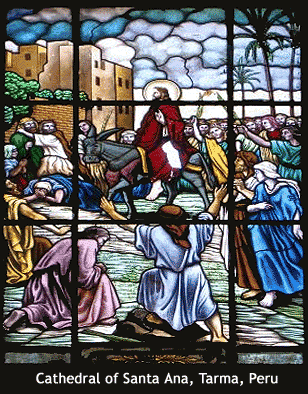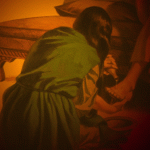There aren’t many stories you can read again and still feel the same excitement and suspense you did the first time you read it. Outside the church this morning, we heard the story of Jesus’ triumphal entry into Jerusalem—again. We’ve all heard it before; so even as we were listening to it, we knew what was going to happen next, didn’t we.
That makes it really hard for us to imagine what it was like for the people who were there that first Palm Sunday. They didn’t know what was going to happen; they just knew what Jesus had done up until that time. Some of them hoped Jesus would save them. They praised God for him, crying out, ‘Blessed is the King who comes in the name of the Lord. Peace …!’ Others might have feared for Jesus’ safety; and yet others might have seen him as a threat. They tried to get him to silence the crowd.
As we try to recall this story right now, we’re doing our remembering while just having heard the whole of Luke’s Passion story. It’s as though we’ve camouflaged the Palm Sunday episode; it’s as though we’ve walked through an entire forest, and then turned round to try to peer through the trees to look at just one little grove in it. If we tried to retell the Palm Sunday story from memory, we might put in extra details that aren’t there, or leave things out that we think happened at a different time.
But to figure out what the Palm Sunday story really says to us, we need to be able to think about it just by itself; to think about what it was like for the people who were there. So lets think first about the people who walked with Jesus, and then the ones looking out from Jerusalem who watched him coming.
We met the people walking alongside Jesus as they approached Bethphage and Bethany. Bethany was the home town of his friends Mary and Martha and their brother Lazarus; the one Jesus raised from the dead. Bethany is over the back of the Mount of Olives, just out of sight of Jerusalem.
Can you imagine the excitement?
The one who had raised Lazarus from the dead coming back to town! But he sends people ahead of him, asking them to arrange for him to borrow a colt that has never been ridden. So he has a sort of advance guard doing something odd. And when they’re asked for an explanation, they’re told simply to say ‘the Lord needs it’. People will wonder about this, and of course the advance guard will talk a little bit more than that were instructed to. They’ll pop in that detail about a colt that has never been ridden. Maybe someone can explain it to them?
People who know the scriptures might tell them that it’s about something sacred, and also something about a King “According to Num 19:2 and Deut 21:3, an animal to be used for certain sacred purposes must be chosen from those that have never been used for ordinary labour, and according to m. Sanh. 2.5, no one else may ride the king’s horse” (Tannehill, 282-283). Clever people will start putting two and two together. The one who resurrected Lazarus, the one who calls himself Lord, the one who does things foretold in the tradition, something about the holy one, about a King; the excitement will build and build.
And as they come up the back of the Mount of Olives and reach the top, Jerusalem, dominated by its gigantic Temple, slowly steals into view. He must be coming to take it. That’s what they’ll think; that’s what they shout; ‘Blessed is the King who comes in the name of the Lord!’ It’s so exciting—surely they are at the centre of history in the making!
But what of the other side of the valley. What do they see? Naturally word will have gone ahead; Romans spies; Temple spies. By the time Jesus comes into view, they will know everything; all the details about the colt, all the speculation in the excited crowd.
The Temple Mount, looks out across to the steep side of the Mount of Olives—the triumphal procession will be like a slow-moving painting. The Roman headquarters, the Antonia fortress, commands a clear view both over the Temple precinct, and the Mount of Olives.
The soldiers will watch everything from their battlements. I don’t think they’ll believe it’s an insurrection—these aren’t insurgents. More likely it’s a factional battle brewing between groups of religious lunatics.
And the Temple authorities will be watching too, trying to measure the threat; preparing strategies to quench a dangerous new movement. If they don’t stop it quickly, there’ll be soldiers out on the Temple Mount imposing martial law before you know it. You can sympathise with all of them really; that is, until you think about the decisions some of them took.
 What Palm Sunday calls from each of us is a decision. Luke calls us to decide whether we’re walking with the crowd of people who surround Jesus, or whether we’re watching him coming.
What Palm Sunday calls from each of us is a decision. Luke calls us to decide whether we’re walking with the crowd of people who surround Jesus, or whether we’re watching him coming.
That’s not to say that we have to decide to feel exactly the same way those excited people coming through Bethany felt; nor that we should feel challenged the way the authorities in Jerusalem did. We can’t feel that way; because for us the story is mediated through the story of the Passion. We know that walking with the crowd is a walk to tragedy and remorse. We also know what resisting Jesus’ approach meant.
Yet the cries of the crowd tell us that Jesus’ approach is a challenge to achieve peace; heavenly peace. And we do have to make decisions about that for our own time. We have to decide what will make for peace within ourselves; peace between ourselves and others; peace between dominant groups and the people they control. God’s peace is always linked to justice.
The Gospel challenges us to enter Holy Week determined to choose for this just peace. For our parish particularly, this challenge has a special focus. We’ve spent the season of Lent studying the plight of Australia’s aboriginal people. It’s as though a procession is approaching us from another mount; the Mount of Uluru. And as we watch its approach, we have to decide what will make for God’s just peace in this land, and in our time. Amen

